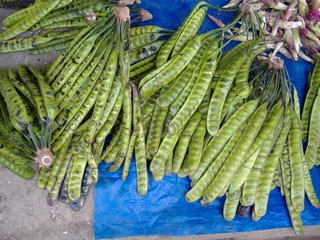Weekend Herb blogging Yongchak Parkia
 The Locals call it Yongchak, the scientific name is Parkia roxburghii, and google gave reference to the english name of tree beans. I don't know where else the same is relished. I am going to blog about the same for Kalyn's Weekend Herb Blogging.
The Locals call it Yongchak, the scientific name is Parkia roxburghii, and google gave reference to the english name of tree beans. I don't know where else the same is relished. I am going to blog about the same for Kalyn's Weekend Herb Blogging.Ask any Manipuri living away from Manipur, what they miss the most and they will say Yongchak Eronba.
Eronba is a very common dish, that is had almost daily as a staple dish. It is a dish made of mashed vegetables, flavored with chillis, smoked fish and Fermented fish. Potato is the base ingredient, other ingredients being beans, bamboo Shoots, banana stem, banana flower or many other vegetables, the all time favorite being the yongchak. It is garnished with many other herbs.
So Yongchak eronba is what we miss a lot, when we are away from home. To give you an idea, I had yongchak eronba for the whole week that I was home. Even though we couldn't prepare it the way we do since we were on a vegatarian diet for 14 days due to the death of the Aunt.
We mashed the potato with Yongchak and flavored with crisp fried Onions, red chilli and Maroi nakuppi (garlic chives).
Yongchak can also be cooked with Fish. Tilapia taste great when cooked with Yongchak or this tree beans...
Recipe: Yongchak with Tunghanbi or Tilapia
Scrap the skin ( a skilled job, which is best outsourced to Manipur) with a scrapper.
Cut into half inch pieces.
Cut Tilapia in half and mix a little turmric and salt and keep for an hour.
Shallow fry the Tilapia ( Tunghanbi in manipuri) on both sides for 10 minutes each in low heat and keep aside.
Fry onions till golden brown in 2 tbs of peanut oil, add a tbs ginger garlic paste.
Add 2 Potatoes cut into slices, add half a cup of peas, add the Yongchak.
Saute for 5 minutes, and add 1/4 tsp turmeric, and tsp each jeera powder and dhania powder.
Add 1/2 tsp of chilli powder.
Saute in low heat for 5 minutes and add water.
Let water boil for a few minutes, and add the fish. Add salt to taste.
Let Shimmer for 10 minutes.
Garnish with coriander and serve...







7 Comments:
YAY..learnt something new on this Saturday morning. It is amazing how little I know of Indian food. Thanks!
I am always so excited when someone writes about a new plant I've never heard of!! This is brand new to me, and it sounds wonderful.
This comment has been removed by a blog administrator.
Yongchak is very common in southern Thai cooking and other part of south east Asia. Check out the following links:
http://www.thaitable.com/Thai/Ingredients/Stinky_Bean.htm
http://realthai.blogspot.com/2005/12/southern-thai-food.html
Yes yongchak is a popular beans for thai people. My sister who is in singapore was amazed to see people selling yongchak at malls. Also once we had gone to a thai restaurant we had thai chicken curry and we were quite surprised to see that they garnished it with what you call "mayang maton" in manipuri.
Btw your blog is an interesting read.
Hi, there!
I think you have placed a wrong picture there in your blog. The picture is not Parkia Roxburghii. It is what we call in Indonesia as Petai, or in Chinese is Zhou-tow and the literally translation is stinky beans. When you eat the beans, they will leave some what strong odour in your mouth, and also in you urine when you go to the toilet.
Please refer to this link:
http://en.wikipedia.org/wiki/Parkia_speciosa
Yet, Indonesian people love to eat that 'petai', it is eaten raw, steamed, fried, or cooked with other vegetables and meat - beef, pork, chicken or seafood, or baked or grilled. Dip it in the chilli paste as a side dish, together with other 'lalaban' or vegetables - raw or steamed.
I think the so called Parkia Roxburghii is different from Petai - as shown in your picture. Your picture might be Parkia Speciosa.
Best regards,
Ophoeng
@ Ophoeng:
You are right. It is exactly Petai as you may call. We call it yongchak. Thanks for correcting the scientific name. I got that name from some friend who was studying botany..
Post a Comment
Subscribe to Post Comments [Atom]
<< Home